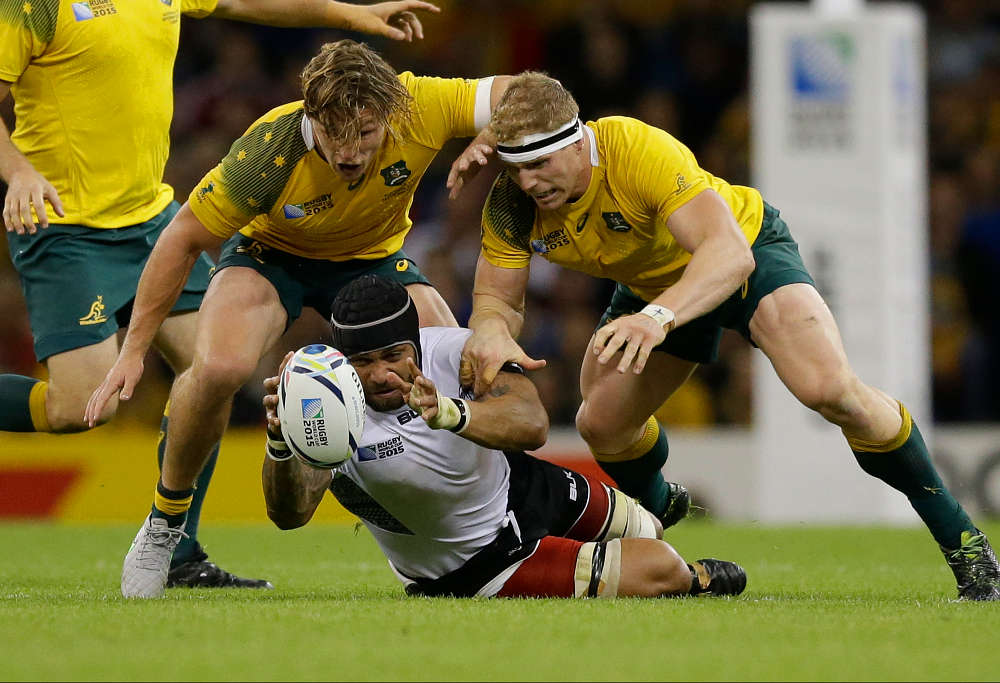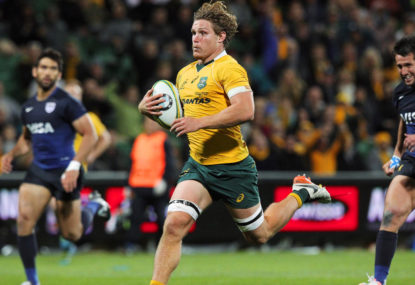According to many pundits and Roarers, Michael Hooper is manifestly unfit for the Wallaby captaincy. One half the argument goes to his leadership abilities, the other half to his playing abilities.
I will be addressing only the latter in this article.
I will come clean about one thing right off the bat – I am a Waratahs fan. And so feel free to knock my arguments based upon this logic if you like. But I think the discussion would be better served by playing the ball not the man.
The story goes that Michael Hooper should not be an automatic selection for the Wallabies, and thus should not be considered for Wallabies captain. I’ll critique what I think are the three core arguments.
1. He spends too much time ranging around in the backs, and thus neglects the core work of a number seven, namely, clearing out rucks and winning turnovers
This argument can perhaps be summed up by this Mark Ella quote: “he has to decide whether he wants to play in the forwards or in the backs.”
Does he now Mark?
Players that link between forwards and backs are integral to the modern game. Teams that have an ‘extra’ back at key moments in a match create a lot more scoring opportunities. I can think of no better example than Dane Coles for the All Blacks. He is encouraged to play like this because his play leads to tries, and tries win matches.
By all means make the argument that by spending so much time among the backs Michael Hooper neglects his core roles, but criticising a player along these lines on face value seems ridiculous.
And so onto the second half of this argument, that Hooper does not do the job of an openside flanker well enough to warrant selection.
Hooper’s work at the breakdown has to my mind clearly improved, and some statistics back that up. In this year’s Super Rugby tournament, he ranked number two for turnovers won.
Then there are the new rules. Spiro Zavos’s recent column about the Wallabies captaincy kind of made my head spin. I’ll quote Spiro here, talking about David Pocock, arguably Australia’s best over the ball open-side flanker:
“Pocock is a traditional number seven; brilliant over the ball at a time when the laws of rugby are being adjusted to take this skill, with its high risk of head injuries, out of the game.”
If the rules are changing to take fetching out of the game (although I’m not convinced it will – but this is another argument), wouldn’t that increase Michael Hooper’s relative value because his supposed weak ball fetching would no longer cost the team the now non-existent turnover opportunities?
My personal opinion is the weakest area of Hooper’s game relative to, say, David Pocock, is his cleaning out on attacking rucks. This goes somewhat to his positioning – if you’re waiting for the pass you’re not up the arse of the guy getting tackled – and somewhat to his physical size.
He doesn’t blow blokes of the ball like a bigger man. But again, if people getting their hands on the ball is not so common in the game, is this not also somewhat nullified?

(AP Photo/Matt Dunham)
2. Hooper is a ‘lone ranger’ – which I take to mean he supposedly does not work in concert with his teammates
Again, it was Spiro Zavos who really got my goat up on this one, and I quote:
“This Lone Ranger mode is a strength of his [Hooper’s] game, allowing him to explode in brilliant one-off runs, for instance. But it is also a weakness, as his whole game is much less effective throughout the 80 minutes of play than it is in a handful of moments.”
Except that he doesn’t just do it in a handful of moments. He does it repeatedly for 80 minutes. And how is being in position to take the pass and running into the gap not being an ensemble player?! The gap is often created as part of an ensemble play! Head shaking stuff this.
Finally, I’ll like to take you all back to two Nicholas Bishop articles, a much more astute rugby scribe than I, to make my case further.
His article from 2016: ‘Was Bob Dwyer right about Michael Hooper?’ And from 2017: ‘The Wallaby back five has taken five steps back’. My take on the main jist of these two articles is as follows:
1. Hooper is actually good in contact – at being physical – and is relatively effective at creating breakdown pressure, and;
2. Hooper may at times seem like a “lone ranger” but this is because his teammates don’t match his fitness and speed, and dare I say commitment, or is it pain threshold?
The latter is perhaps most telling. To criticise a player for being too good, and thus making “lone ranger” game breaking plays is ridiculous. How about, why in the world was someone not there with him?
3. Hooper weakens the lineout, especially if picked with David Pocock.
I’ll grant that the lineout does mean the that picking ‘Pooper’ has its pitfalls. To me, the deciding factor here is whether or not the locks and number 8s are genuine world class jumpers – they basically have to be – and your lineout thrower of the top ilk. This is all possible to achieve, but by no means easy with our cattle.
The new rules may prove to be the deciding factor here, as if Pocock’s impact is limited, this may tip the scales towards not picking him.
For my mind going into the future – letting time tell on the availability of top lineout operators and Pocock’s effectiveness – the main challenger to Hooper is Liam Gill. He has a complete game that could become even more complete in time. It is a shame he didn’t stay in Australia and push for a spot in the side.
This being said, much of the whinging on this site would have one believe that Gill’s leaving was somehow the fault of Michael Cheika for picking Hooper.
So a coach prefers another to you? Get better. Make it impossible for him to leave you out. This is what New Zealanders desperate to play for the All Blacks do on a regular basis.
Hooper is one of Australia’s best rugby players, and thus deserves his spot, but he is no Richie McCaw; Liam Gill could have, and still can, take his spot. Gill has played well, but not kicked down the door.































































































